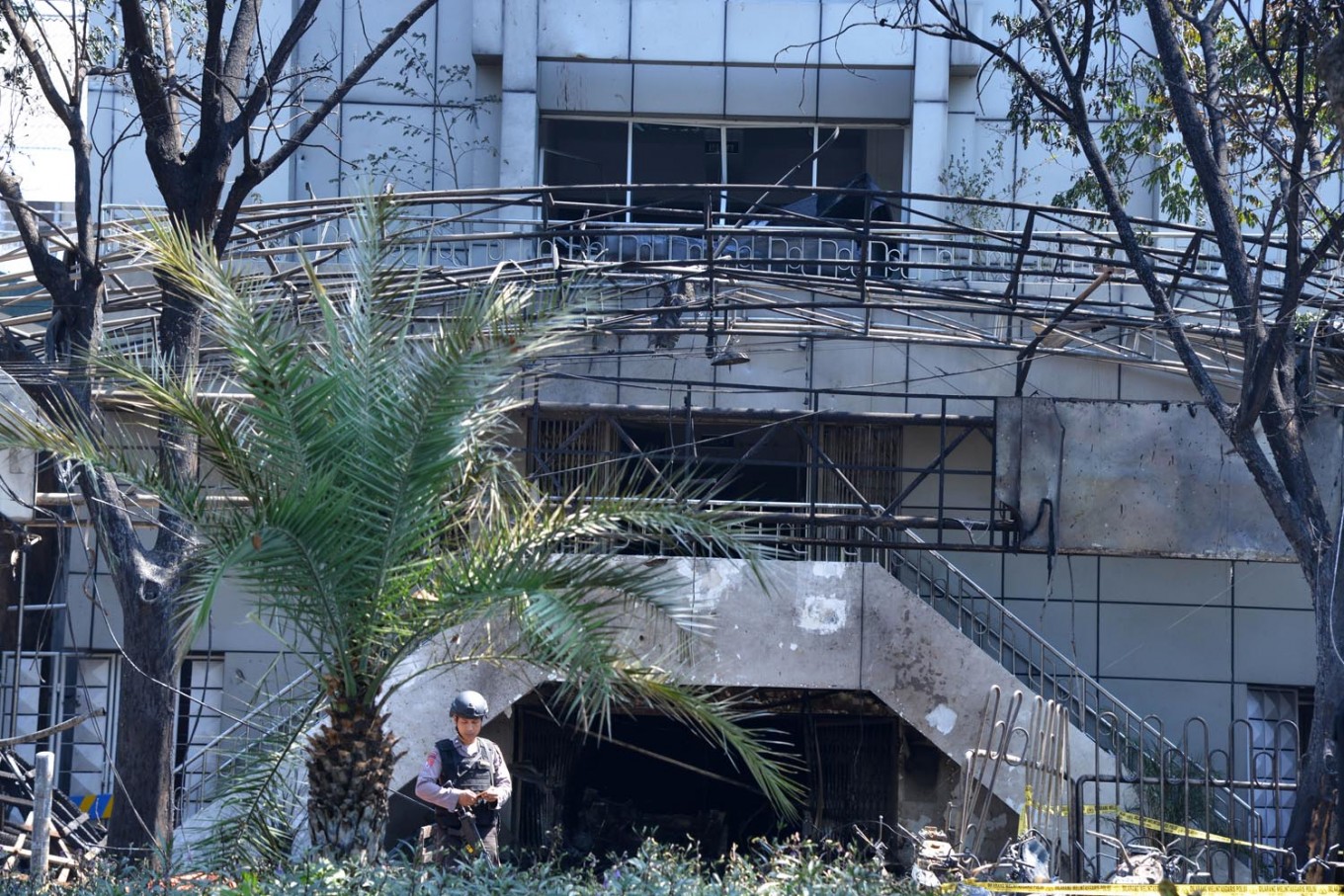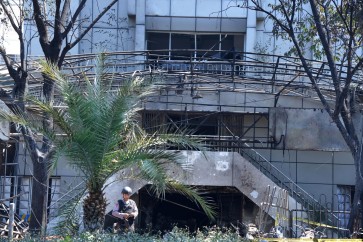Popular Reads
Top Results
Can't find what you're looking for?
View all search resultsPopular Reads
Top Results
Can't find what you're looking for?
View all search resultsTempering fear of returning foreign terrorist fighters
Indonesia has an imminent returning foreign terrorist fighter (FTF) challenge. The latest data from Indonesia’s Countering Foreign Terrorist Fighters Task Force showed that the state has received more than 600 deportees and returnees, while still needing to deal with around 630 Indonesian citizens still in Syria and Iraq.
Change text size
Gift Premium Articles
to Anyone
 A policeman stands guard outside the Surabaya Centre Pentecostal Church (Surabaya Gereja Pantekosta Pusat) in Surabaya, East Java on May 13, 2018. A series of blasts, including a suicide bombing, struck churches in Indonesia, killing at least nine people and wounding dozens in the deadliest attack for years in the world's biggest Muslim-majority country. (AFP/Juni Kriswanto)
A policeman stands guard outside the Surabaya Centre Pentecostal Church (Surabaya Gereja Pantekosta Pusat) in Surabaya, East Java on May 13, 2018. A series of blasts, including a suicide bombing, struck churches in Indonesia, killing at least nine people and wounding dozens in the deadliest attack for years in the world's biggest Muslim-majority country. (AFP/Juni Kriswanto)
I
ndonesia has an imminent returning foreign terrorist fighter (FTF) challenge. The latest data from Indonesia’s Countering Foreign Terrorist Fighters Task Force showed that the state has received more than 600 deportees and returnees, while still needing to deal with around 630 Indonesian citizens still in Syria and Iraq. Indonesia should acknowledge that statistical and qualitative assessments of the threat of returning FTFs conclude mixed and nuanced results. While the state should not ignore their threat, they should not exaggerate it either.
Returning FTFs is not a new phenomenon. During the Afghan-Soviet War of 1978 to 1992, between 5,000 to 10,000 individuals flocked to the conflict zone to assist local Afghan fighters. Although a significant number of them moved to other conflict zones such as Bosnia, Chechnya and Algeria, many returned and significantly increased the capacity of domestic terrorist groups in their homelands. Indonesia’s own Jamaah Islamiyah, for instance, relied heavily on members returning from Afghanistan to form the group’s core planners and bombers such as Hambali and Noordin M. Top.
The problem of FTFs returning from Syria, however, is unprecedented. Alex Schmid noted that the 2012 Syrian conflict attracted three to five times as many FTFs compared to the Afghan-Soviet War, with around 25,000 to 30,000 individuals traveling to the conflict zone, most of them expected to return. Out of all of these FTFs, around 80 percent came to be part of the Islamic State (IS) movement. Indonesians began going to Syria in late 2012, with the numbers peaking in early 2016. By March 2017, the Soufan Group reported that the number of Indonesians successfully emigrating to Syria reached 600 people, with an additional 435 being stopped or deported by Turkey.
Returning FTFs undoubtedly carry a significant security threat. A study on returning FTF attacks in Western Europe showed that out of 46 IS-linked attacks and plots between 2014 and 2016, a returning FTF was involved in 39 percent of them.
Although their involvement in the attacks and plots can vary (e.g. executor, recruiter, ideologue, planner), studies commonly conclude that the presence of returning FTFs increases the effectiveness of a group’s attacks. Thomas Hegghammer’s records of terrorist attacks against Western countries found that plots that involve returning FTFs are almost twice as likely to reach execution and cause fatalities compared to plots that do not.
This threat has become more prominent in the case of returning IS FTFs. As Rukmini Calahachi reported, having certain operatives return to their home countries to prepare attacks or inspire self-radicalized lone wolves is an actual IS strategy. The group’s special intelligence branch, Amn Al-Kharji (also called Emni), was reported to have been specifically set up to promote and coordinate these kinds of operations. Using encrypted communication services or even directly sending fighters abroad, the branch has given instructions to guide (e.g. assisting target selections) multiple terrorist plots outside of Syria and Iraq, such as the 2015 Paris attacks and the 2016 Brussels attacks.
Indonesia certainly isn’t an exception to the threat of returning IS FTFs. The mastermind of the Surabaya 2018 triple church bombings, Dita Oeprianto, for instance, was reportedly inspired by a returning FTF from Syria. More recently, a foiled plot by members of Jamaah Ansharut Daulah (JAD) to attack on May 22 was also reported to have involved nine returning FTFs in its planning process. The latest involvement of returning Indonesian FTFs in a terrorist attack, however, was reported in the Philippines. A husband and wife who were deported from Turkey in January 2017 were found to be the culprits of a suicide bombing attack on a cathedral in Jolo.

















